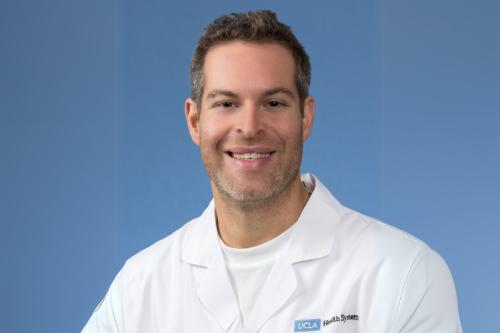
Avi Samelson, Ph.D.
- Assistant Professor, Neurology
- Assistant Professor, Biological Chemistry

Avi Samelson, Ph.D., investigates how different brain cell types regulate and are affected by protein aggregation, a hallmark of neurodegenerative diseases such as Alzheimer’s, Parkinson’s and ALS. His research aims to uncover the cellular mechanisms that drive pathological protein aggregation and identify new strategies to prevent or reverse these processes.
Understanding how proteins misfold and aggregate within cells is key to tackling neurodegeneration. Samelson studies aggregation trajectory — the large-scale conformational changes proteins undergo as they aggregate — and how various brain cell types influence this process. Using a protein energy landscape approach combined with CRISPR-based systems genetics in stem cell-derived brain cell types, he is mapping the cellular pathways that regulate protein aggregation and degradation.
Samelson previously discovered fundamental principles governing protein folding and developed new screening techniques in induced pluripotent stem cell-derived neurons to study the aggregation and turnover of tau, a protein implicated in nearly all dementias. His current work explores how the ubiquitin-proteasome system degrades tau and alpha-synuclein, how post-translational modifications influence protein aggregation and how early molecular events shape the progression of neurodegenerative diseases.
Samelson is committed to trainee mentorship and promoting justice, solidarity and equality in science.
Research Projects
- Investigating how proteins form harmful deposits (amyloid fibrils) in diseases like Alzheimer’s and Parkinson’s, and why these structures take on different shapes in different conditions
- Identifying the earliest warning signs of protein aggregation to uncover potential intervention points before damage occurs
- Understanding how brain cells use their natural waste disposal system (the ubiquitin-proteasome system) to break down problem proteins—and why this process sometimes fails in neurodegenerative diseases
- Developing new tools to track and control protein shape changes, helping researchers better understand how misfolding happens and how it might be prevented
-
Post-doctoral Fellowship
- Neurodegenerative Disease, University of California, San Francisco, 2025
Degree
- Ph.D., Molecular and Cell Biology, University of California, Berkeley, 2017
